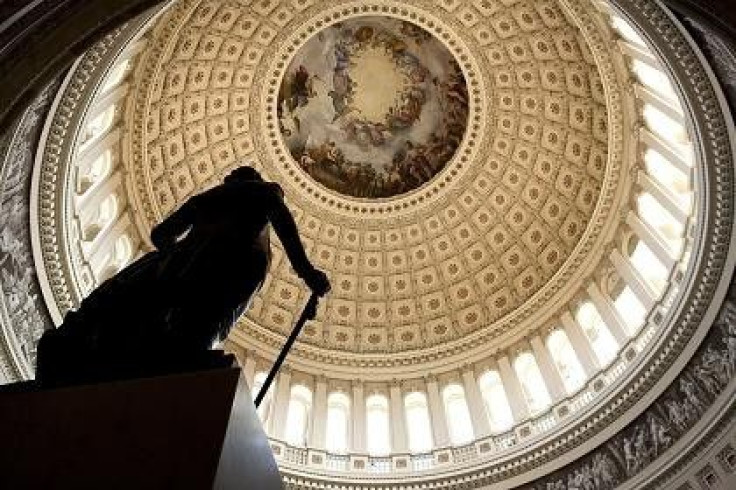The Quickest Way to Balance the U.S. Budget
OPINION

Long before there was anti-tax lobbyist Grover Norquist, there was economist Arthur Laffer.
Economist Arthur Laffer, one of the advocates of supply side economics, who rose to prominence during the Reagan Administration, has penned a book, co-authored with Stephen Moore and Peter Tanous, called, The End of Prosperity: How Higher Taxes Will Doom The Economy - If We Let It Happen, (Simon & Schuster, 2008).
Yours truly is waiting for the book on order, so I haven't had a chance to read and review the book yet, but Laffer, in interviews, offered readers several shortcuts via his book tour to promote the book, summarized below.
Laffer: Key to Economy Is Incentives
Laffer, speaking on Bloomberg Radio, essentially argues for a return to supply side economics, or income tax cuts across-the-board, especially on upper-income groups, arguing that the cuts will increase incentives for business investment, commercial activity, and for work. Obviously, Laffer opposes the Obama administration's plan to reverse the 2001 Bush tax cut and restore the 39.6 percent top income tax rate.
If you tax rich people, and give money to poor people, you'll get fewer rich people and more poor people, Laffer told Bloomberg Radio.
Laffer is against redistributing income and wealth for economic and social goals, arguing that they are ineffective. (He's maintained this primitive and macroeconomically-flawed stance despite the fact that the top one-tenth of one percent -- that's 0.1 percent of the nation's adults -- control about 50 percent of the nation's wealth and income. )
However, the view form here argues, regarding Laffer's analysis, nothing could be further from the truth: Social Security has successfully redistributed income and wealth for more than 70 years, and in the process it has lifted tens of millions of senior citizens out of poverty annually. Contrary to Laffer's theory, the redistribution of income under Social Security has decreased the number of poor people in the United Social -- an enormous social good, amid an economic system that is harsh. Without Social Security, whole swaths of the U.S. populace would be destitute. Further, without Social Security, the U.S. would not have had the income stability that the nation has experienced since the FDR era.
In addition, Laffer also fails to note the important role Medicare has played in the U.S. social safety net. The U.S. also passed Medicare in 1965, the health insurance program for senior citizens that redistributes health care dollars via a special tax, with the goal of guaranteeing that every senior citizen, regardless of income, will have health insurance. In that sense Medicare is also a redistributive program. Without Medicare, millions of senior citizens would not have any health insurance, and many would go without medical services, period.
If you cut federal income taxes, federal revenues will rise, Laffer also said.
Again, the view from here offers a decidedly different -- and more accurate -- analysis: apparently Laffer refuses to read U.S. Treasury budget statistics data. Following the supply side Reagan tax cut of 1981, which slashed income tax rates on upper-income groups, the budget deficit increased to $128 billion, then $221 billion before stabilizing at about $155 billion by the end of Reagan's presidency in 1989. The deficit increased to $255 billion under the presidency of George H.W. 'Pappa' Bush, R-Texas,1989-1992.
Bill Clinton, a Democrat from Arkansas, was then elected president in 1992, and Clinton effectively lobbied Congress to pass the 1993 tax increase on upper-income groups. What happened next to the budget deficit? It plunged, falling to $164 billion in 1994, then disappeared entirely in 1997. You read correctly: the U.S. government ran a surplus of $69 billion in 1997, rising to $236 billion in 2000. At the end of Clinton 's presidency in 2001, the U.S. budget surplus was $128 billion!
Then in 2001, President Bush W. Bush, R-Texas, was successful in repealing Clinton's 1993 tax increase on upper-income groups, and here's what happened to the budget: the deficits returned, and later ballooned with the increase in defense spending for the Iraq and Afghanistan wars, among other spending increases. Further, 'Bush 43' was on pace to end his presidency with a budget deficit of about $400 billion until the financial crisis hit: subsequent bank bailout legislation and related intervention legislation then sent the budget deficit over $1 trillion for the first time in the nation's history by the end of 2008.
Underscoring, the U.S. government was running a $1 trillion deficit prior to Barack Obama taking the oath of office in January 2009.
To Balance Budget, Raise Taxes on Upper-Income Groups
Economist Laffer is correct in observing that lower tax rates increase commercial activity, but he is dead wrong about the relationship between income redistribution and economic strength, and about the impact higher taxes on upper-income groups will have on the budget deficit.
Income redistribution, by lifting millions out of poverty and enabling more citizens to achieve decent incomes, creates a stronger, more-balanced economy -- one more capable of sustainable U.S. GDP growth. Further, cutting income taxes on upper-income groups will not eliminate the nation's budget deficit: as the Reagan and 'Bush 43' years demonstrate, it's a prescription for fiscal disaster. Raising income taxes on these groups, combined with modest spending cuts to defense and other programs, will eliminate the budget deficit, however.
- -
© Copyright IBTimes 2024. All rights reserved.











